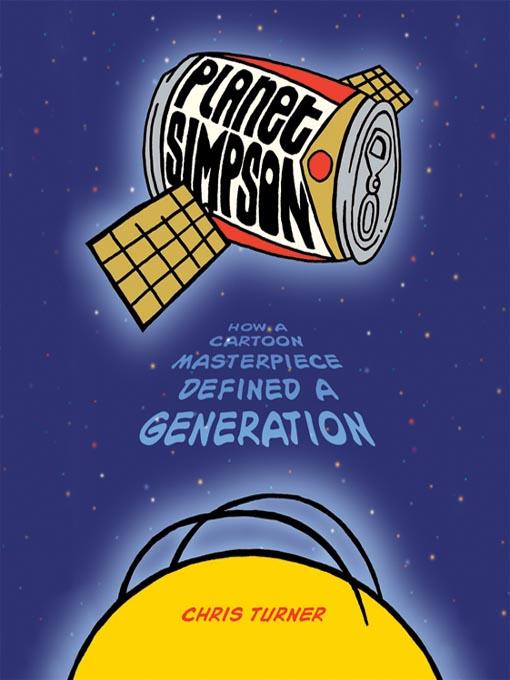
Planet Simpson
How a Cartoon Masterpiece Documented an Era and Defined a Generation
کتاب های مرتبط
- اطلاعات
- نقد و بررسی
- دیدگاه کاربران
نقد و بررسی

[Editor's Note: The Following is a combined review with MAMA DON'T ALLOW, MUFARO'S BEAUTIFUL DAUGHERS, and SPACE CASE.]--Listening to children's books you have read aloud yourself is an interesting experience; you appreciate the positives and negatives of each performance in light of your own. Ultimately, however, it is often the musical accompaniment that makes the most difference. MOLE MUSIC, written by David McPhail and performed by Jim Weiss, is a perfect selection for a read-along. Weiss's narration of McPhail's lovely story is slow and gentle, allowing the reader time to read along and enjoy the wonderful illustrations. The violin music in the background enhances the mood--from the screeching in the beginning to the soft, gentle melodies that entertain the world in the end. The illustrations, showing the double story above and below the ground, underscore the themes of practice, peace, and humility. Likewise, it is the music that makes the difference in the read-aloud version of MAMA DON'T ALLOW, by Thacher Hurd, performed by Tom Chapin. The wonderful jazzy introductory music sets the tone, and off we go. Chapin's friendly, easy-going voice invites us along, and the read-aloud format with background music makes it easier to narrate from the balloons on the pages. Chapin's alligator voices are excellent--a little sly, a little rough, and each one unique. Even good background music can't make up for an unimpressive narrator. In MUFARO'S BEAUTIFUL DAUGHTERS, read by Robin Miles, the narration is almost too slow, building little momentum for the story. Miles's accent is interesting, although it's hard to tell if it's intended to be some African dialect. With little differentiation among the characters and a singsong quality to the narration, Steptoe's African retelling of a version of "Cinderella" becomes monotonous. And finally, music and sound effects can help improve a less than exceptional story line. In SPACE CASE, by Edward Marshall, the music adds to the Halloween mood, but it is the computer-simulated voice for the alien and the real kids' voices in this multicast performance that make it an enjoyable listening experience. The voices and musical accompaniment only help to enhance the whole experience and make it a solid choice for younger kids. W.L.S. (c) AudioFile 2002, Portland, Maine

Simpson fans will rejoice at this lengthy thesis, which elevates a long-running cartoon to cultural keystone in a coffee table book for the ears. Narrator Oliver Wyman has a gift for mimicry, delivering not only a lively read, but many satisfying renditions of favorite "Simpsons" characters. The series' history is exhaustively examined, down to the serial number and title of particular episodes and their significance in the "Simpsons" body of work. While it's open to question whether "The Simpsons" will prove to be as pivotal a cultural work as the author claims, the rollicking fun of the show shines in this analysis and tribute. D.J.B. (c) AudioFile 2005, Portland, Maine

October 4, 2004
Although this unauthorized book "was not prepared, licensed, approved, or endorsed by any entity involved in creating or producing" The Simpsons
, Canadian journalist Turner embarks on an encyclopedic exposition of the show's episodes, catchphrases, characters, cultural impact, social commentary, themes and influences. In 1987, 33-year-old cartoonist Matt Groening devised the dysfunctional family during a 15-minute wait before pitching the concept to producer James L. Brooks. Short segments on Fox's Tracey Ullman Show
escalated into the full series in 1989–1990, with accolades and awards piling up during the following 15 years. Turner flavors his straightforward Simpsons study with footnotes and facts on everything from Ayn Rand and Columbine to Y2K and Yeats. Unraveling and analyzing plot threads, he views the series as "more anti-authoritarian by far than almost anything else that's ever aired in prime time," and he praises it as a "cultural institution" comparable to the Beatles. Turner's fannish enthusiasm and tsunami of trivia will appeal mainly to devotees, though cultural historians may value it for its vision of Springfield as a satirical mirror reflecting the trials and tribulations of contemporary life. (Nov. 1)
Forecast:
Although the show is past its heyday, diehard fans will gravitate to this like Homer to donuts.

























دیدگاه کاربران